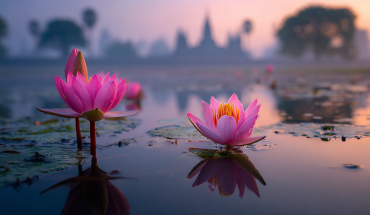Some people face these questions:
- My day to day life doesn’t allow me to meditate at all.
- I have the feeling that i do not progress in my meditation.
- The retreat was fine, but now all the calmness and serenity is fading away again.
Your goal would be one of the following. Reach for a place of resting, don’t reach simply for the reaching:
A.) Meditate until you get to know and master the 4 jhanas. Done. Enjoy them for the rest of your life. Meditation stops to be a struggle and becomes a dessert.[link]
B.)You want more then heaven in the next rebirth or you fear that watching a 100 bigbangs might get boring after a while? Try your local Vipassana retreat and head for at least the “Udayabbaya” stage, the insight-knowledge of rising and falling. Chances are you might enter the stream before you die [link]
C.) You prefer to taste the fruit of a stream-enterer before your death. Meditating on nibbana and experiencing deathlessness motivates you enough to go on retreats (plural) which might take several months each – at least thats what you are willing to do. Good. You might at least reach “Sankharupekkha” in this life, the insight knowledge of the equanimity with regard to all phenomena. If you happen to be a Bodhisatta with a real (and i don’t mean i-like-to-help-others or compassion-as-mainstream) determination formed over numerous lives you would not be able to push your insight meditation beyond this barrier. That’s good to know too, isn’t it. [link], p 103.
D.) You are not satisfied with the prospect of another 7 lifes in samsara, or just two, or for that matter, one. Even if they mean watching from the gallery with the personal experience of liberation. Then, probably, it is best time to think about entering the order and becoming a monk or nun in an established meditation monastery of which there are quite a couple. Let us know when you attained to Arhatship…but i guess, you won’t tell us then. [link]
So, what is your goal? At least strife for a position (and know there exists one – this text was written to bring you the news…) which means abiding, not struggling. Many prefer to imagine they reached a shore when they sit on a raft and forget to paddle. Likewise wary is the situation for those who strife, but don’t know in which direction.
PS: Sorry, forgot two alternative goals…this posting was too Theravadin anyway :-). Okay, here comes choice 5:
From stream-entry to the peace and perfection of an arahant: that’s too easy for you. You prefer to either help millions of others reach for enlightenment, knowing, the whole concept of others might just be a part of a delusion – but genuine compassion makes you determine to become
- a disciple of a future Buddha
- a paccekabuddha (an Awakened being without teaching others – much like an arahant but without getting any help)
- a Buddha yourself
In any case those three options are not for the faint hearted. They will mean you keep on going in Samsara.
In case you wonder what that means for your meditation: Chose between A) and B)
PS: In case you find this article offends your “Buddhist understanding” of goal-lessness i encourage you to read this post next
One of the reasons for this post was especially to counter the widespread (modern) notion that Buddhism has no goals. The Buddhist teaching does point out a goal, which is Nibbana, the end of goals. In fact, an amazing characteristic of the Buddha’s teaching is that it in a scientific and pragmatic manner shows exactly how to get from the first step to the last, explaining milestones on the way as well as experiences so that anyone can check his progress and repeat what the Buddha discovered 2550 years ago.




8 comments